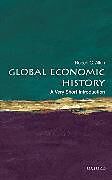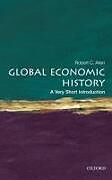Global Economic History
Einband:
Kartonierter Einband
EAN:
9780199596652
Untertitel:
A Very Short Introduction
Genre:
Management
Autor:
Robert C. Allen
Herausgeber:
Oxford University Press
Anzahl Seiten:
192
Erscheinungsdatum:
15.09.2011
ISBN:
978-0-19-959665-2
Informationen zum Autor Robert C. Allen is Professor of Economic History at Oxford Univeristy and a Fellow of Nuffield College. He has written on English agricultural history, international competition in the steel industry, the extinction of whales, andt he contemporary policies on education. His articles have won the Cole Prize, the Redlich Prize, and the Explorations Prize. His previous books include Enclosure and the Yeoman: The Agricultural Development of the South Midlands, 1450-1850 (2009), and Farm to Factory: A Re-interpretation of the Soviet Industrial Revolution (2003), both of which won the Ranki Prize of the Economic History Association.He is currently studying the global history of wages and prices and pre-industrial living standards around the world. He is a Fellow of the British Academy and the Royal Society of Canada. Klappentext The gap between the rich and the poor can be vast. Robert C. Allen considers the main factors that contribute to this gap, looking at the interconnections between economic growth, culture, technology, and income distribution. Exploring the historical processes that have created the unequal world of today, he takes a global look at wealth worldwide. Zusammenfassung Why are some countries rich and others poor? In 1500, the income differences were small, but they have grown dramatically since Columbus reached America. Since then, the interplay between geography, globalization, technological change, and economic policy has determined the wealth and poverty of nations. The industrial revolution was Britain's path breaking response to the challenge of globalization. Western Europe and North America joined Britain to form a club of rich nations by pursuing four polices-creating a national market by abolishing internal tariffs and investing in transportation, erecting an external tariff to protect their fledgling industries from British competition, banks to stabilize the currency and mobilize domestic savings for investment, and mass education to prepare people for industrial work. Together these countries pioneered new technologies that have made them ever richer. Before the Industrial Revolution, most of the world's manufacturing was done in Asia, but industries from Casablanca to Canton were destroyed by western competition in the nineteenth century, and Asia was transformed into 'underdeveloped countries' specializing in agriculture. The spread of economic development has been slow since modern technology was invented to fit the needs of rich countries and is ill adapted to the economic and geographical conditions of poor countries. A few countries - Japan, Soviet Russia, South Korea, Taiwan, and perhaps China - have, nonetheless, caught up with the West through creative responses to the technological challenge and with Big Push industrialization that has achieved rapid growth through investment coordination. Whether other countries can emulate the success of East Asia is a challenge for the future.ABOUT THE SERIES: The Very Short Introductions series from Oxford University Press contains hundreds of titles in almost every subject area. These pocket-sized books are the perfect way to get ahead in a new subject quickly. Our expert authors combine facts, analysis, perspective, new ideas, and enthusiasm to make interesting and challenging topics highly readable. Inhaltsverzeichnis 1: The great divergence 2: The rise of the west 3: The industrial revolution 4: The ascent of the rich 5: The great empires 6: The Americas 7: Africa 8: The standard model and late industrialization 9: Big push industrialization Epilogue ...
Autorentext
Robert C. Allen is Professor of Economic History at Oxford Univeristy and a Fellow of Nuffield College. He has written on English agricultural history, international competition in the steel industry, the extinction of whales, andt he contemporary policies on education. His articles have won the Cole Prize, the Redlich Prize, and the Explorations Prize. His previous books include Enclosure and the Yeoman: The Agricultural Development of the South Midlands, 1450-1850 (2009), and Farm to Factory: A Re-interpretation of the Soviet Industrial Revolution (2003), both of which won the Ranki Prize of the Economic History Association.He is currently studying the global history of wages and prices and pre-industrial living standards around the world. He is a Fellow of the British Academy and the Royal Society of Canada.
Klappentext
The gap between the rich and the poor can be vast. Robert C. Allen considers the main factors that contribute to this gap, looking at the interconnections between economic growth, culture, technology, and income distribution. Exploring the historical processes that have created the unequal world of today, he takes a global look at wealth worldwide.
Inhalt
1: The great divergence
2: The rise of the west
3: The industrial revolution
4: The ascent of the rich
5: The great empires
6: The Americas
7: Africa
8: The standard model and late industrialization
9: Big push industrialization
Epilogue

Leider konnten wir für diesen Artikel keine Preise ermitteln ...
billigbuch.ch sucht jetzt für Sie die besten Angebote ...
Die aktuellen Verkaufspreise von 5 Onlineshops werden in Realtime abgefragt.
Sie können das gewünschte Produkt anschliessend direkt beim Anbieter Ihrer Wahl bestellen.
Loading...
Die aktuellen Verkaufspreise von 5 Onlineshops werden in Realtime abgefragt.
Sie können das gewünschte Produkt anschliessend direkt beim Anbieter Ihrer Wahl bestellen.
| # | Onlineshop | Preis CHF | Versand CHF | Total CHF | ||
|---|---|---|---|---|---|---|
| 1 | Seller | 0.00 | 0.00 | 0.00 |
